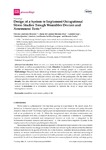Design of a System to Implement Occupational Stress Studies Trough Wearables Devices and Assessment Tests

Use this link to cite
http://hdl.handle.net/2183/26459Collections
- Investigación (FCS) [1293]
Metadata
Show full item recordTitle
Design of a System to Implement Occupational Stress Studies Trough Wearables Devices and Assessment TestsAuthor(s)
Date
2020-08-20Citation
Concheiro-Moscoso P, Miranda-Duro MC, Fraga C, Queirós C, Pereira da Silva Marques AJ,.Groba B. Design of a System to Implement Occupational Stress Studies Trough Wearables Devices and Assessment Tests. Proceedings. 2020; 54(1):19
Abstract
[Abstract]
Introduction: Stress at work is a factor that has repercussions on both a personal and health level, as well as on productivity at work. Objective: To establish if the wearables are devices capable of determining the level of labor stress of working people in a research center. Methodology: This pilot study followed up different variables during 6 months on 11 participants of a research center. In the study, wearables Xiaomi MiB and 3 were used, which recorded and continuously monitored the physical activity and sleep of the participants. On the other hand, different specific evaluation tests were used to measure work stress, quality of life and sleep quality. Results: The data obtained from the tests and the wearables show that men feel slightly more stressed and sleep worse than women; however, men spend more time sitting and walking than women. Conclusions: It is considered important to replicate the study in larger and more heterogeneous cohorts.
Keywords
Wearables
Work stress
Quality of life
Work stress
Quality of life
Editor version
Rights
Atribución 4.0 España
ISSN
2504-3900






